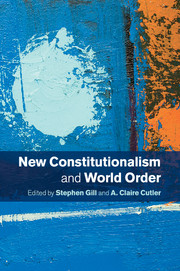Book contents
- Frontmatter
- Contents
- List of Figures
- List of Contributors
- Acknowledgements
- List of Acronyms
- 1 New constitutionalism and world order
- Part I Concepts
- Part II Genealogy, origins and world order
- Part III Multilevel governance and neo-liberalization
- Part IV Trade, investment and taxation
- Part V Social reproduction, welfare and ecology
- Part VI Globalization from below and prospects for a just new constitutionalism
- Glossary
- Appendix
- Bibliography
- Index
Part V - Social reproduction, welfare and ecology
Published online by Cambridge University Press: 05 February 2014
- Frontmatter
- Contents
- List of Figures
- List of Contributors
- Acknowledgements
- List of Acronyms
- 1 New constitutionalism and world order
- Part I Concepts
- Part II Genealogy, origins and world order
- Part III Multilevel governance and neo-liberalization
- Part IV Trade, investment and taxation
- Part V Social reproduction, welfare and ecology
- Part VI Globalization from below and prospects for a just new constitutionalism
- Glossary
- Appendix
- Bibliography
- Index
Summary
Social reproduction, welfare and ecology
Part V addresses the general question: how far and in what ways has the emergent global extension of neo-liberal market civilization, locked in by new constitutional mechanisms, reconstituted some of our basic socioeconomic and ecological conditions of existence? The contributions explore how restructuring of these conditions amidst ongoing crises has deepened contradictions, inequalities and insecurities, and raised fundamental concerns over social reproduction and ecological sustainability, provoking new patterns of resistance and challenges to disciplinary neo-liberalism. The principal themes of Part V are:
How – in the context of global organic crisis and the intensification of social inequalities – the restructuring of systems of social reproduction is linked to more ‘regressive’ and unjust tax systems in ways that are generating significant constraints on expenditures for health and care, welfare and education (‘fiscal squeeze’), developments that are partly the result of the global extension of new constitutional measures.
How the proliferation of private debt in the United States relates to the erosion of welfare and transformations in social reproduction, and how in response the US legal apparatus has strengthened coercive governance via criminalization and incarceration of debtors.
How, nevertheless, new ‘constitutions’ of the social emerge in complex, variegated and uneven ways through neo-liberalization processes.
How the current global financial crisis impacts on social policy regimes.
How the tension between neo-liberal new constitutionalism and the ethical-normative principles required for sustainable and just ecological governance, especially in light of climate change, is posing urgent threats to humanity.
- Type
- Chapter
- Information
- New Constitutionalism and World Order , pp. 211 - 218Publisher: Cambridge University PressPrint publication year: 2014

